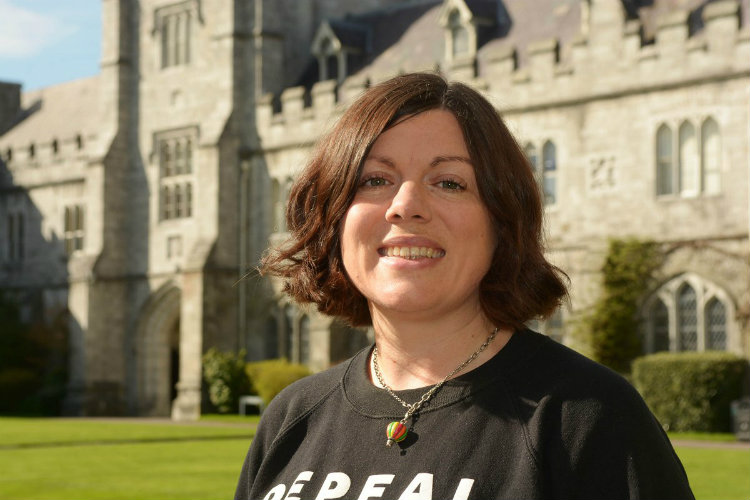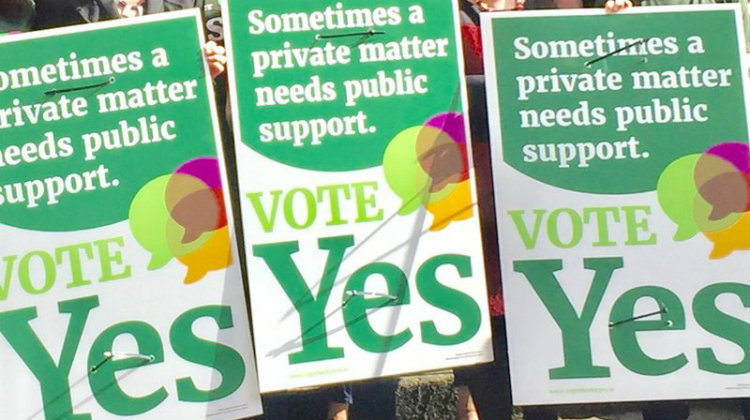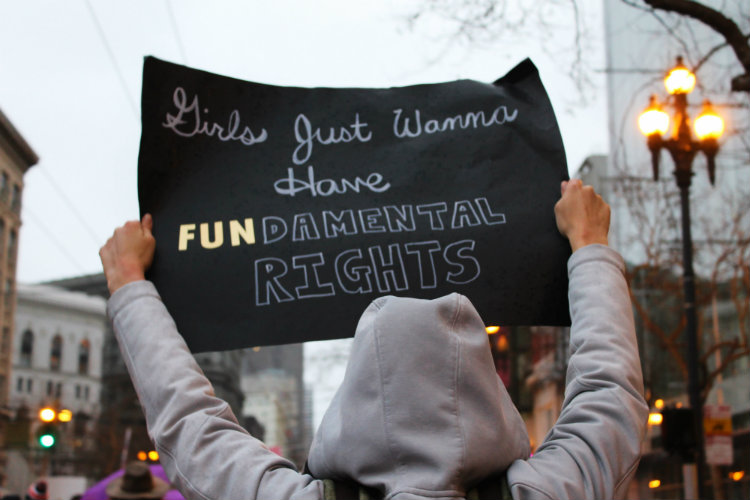Writing The Political: Autonomy Contributors on Inspiration and Activism
In late 2017, Cork-based New Binary Press issued an open call for submissions to a new anthology in aid of the fight – both at home and abroad – for women’s reproductive rights. Autonomy, to be edited by poet, workshop facilitator and pro-choice activist Kathy D’Arcy, was interested in proposals from “serious writers, whether emerging or established, who are interested in pushing the boundaries of language structures and canon-makers while advocating choice.”
High-falutin’ though this may sound, in practice it meant a democratic approach to compiling an anthology that often gathered past, rather than programmed, pieces of work. As contributor Tina Pisco notes, “Thankfully I had a script that I written with my daughter…” (‘Vessel’), while Fiona O’Connor was already rehearsing the play, partly inspired by the Waking the Feminists movement, that is excerpted in the anthology.
Jennifer Seaman Cook quickly found that her work tied in already: “I’m a cultural historian and a poet, and these poems came from a collection that I’m working on which starts from my scholarly understanding and reflects back on generational trauma and social division in specific historical and cultural contexts: in my family, and in my personal life, in my niche within society…I was seeking a kind of autonomy in this writing already, and it was very easy to select the particular poems that related to this call for work.”
Many other contributors similarly noted that the pieces they contributed were already in existence when the call for submissions went out. Dick Edelstein wrote a poem inspired by both women in his life and workshop leader/poet Shirley McClure. Aoibheann McCann’s piece had been inspired by a walk through All Hallows’ in Drumcondra: “I stopped in front of a statue of Mary and the narrative came into my head. I wrote it down straight away.” Anne Casey notes that her included poems were “already in train” when she saw the call for submissions, prompting a polishing-up.

For a smaller number of writers, the anthology’s existence was a prompt; E R Murray notes that her piece (“about actively choosing to not be a mother – not through abortion, but through other life choices”) had been “formulating in [her] mind for a long time but [she] needed the right home for it.” It seems clear that rather than provoke political work, the anthology gathered it together. So what does political writing mean to these contributors?
“In a broad sense, all writing is political,” Tina Pisco says. “When you engage with a reader, you enter their mind and move ideas around – even if it’s not an overt political statement.” Dick Edelstein notes, “I would hope that poetry has a social function. I can’t envision an approach to aesthetics that is divorced from social reality–that would be bizarre.” Angela T Carr notes that writing is still inherently political for women: “It shouldn’t be but there’s been such a silencing of the female voice across society and across centuries, that the act of recording from a non-patriarchal perspective has become political, a way to create space for all kinds of lives and experiences. I don’t think it’s a coincidence that as traditional publishing faces-off against the digital publishing revolution, we’re seeing all kinds of exciting projects that put a spotlight on marginalised voices, e.g. Autonomy, Unbound, The Good Immigrant etc.”
For Storm Waters, whose poem ‘Lament’ appears in the anthology, the political nature of all art forms is a “no-brainer”, Storm says: “It is no accident that recent decades in the white hetero-patriarchal capitalism-dominated, so-called ‘West’ or ‘First World’ have witnessed a systematic depoliticization (or other similar expunging of controversial, thought-provoking messaging) of the arts and entertainment on mainstream levels. This often results in a socio-political ‘dumbing-down’ of the general population among the more privileged classes-which makes oppression and injustice easier to implement, effect, and maintain. Publications like Autonomy represent what appears to me to be a welcome resurgence in socially-conscious, politically-charged messaging and communication… I only hope it is not too late.”

Margaret Cahill, whose short fiction appears in the anthology, agrees that writing can serve as political activism, though notes: “I don’t think mine usually is. I spent 10 years of my life actively involved with the local anti-war movement in Limerick, protesting the use of Shannon Airport by the US military, which is a more visible form of activism. While writing a story won’t usually get you soaked to the skin on a rainy day or harassed by Gardai, it can still be an important way to highlight and challenge things that are wrong with our society, laws and government systems.”
For Yvonne Ahern, a poet featured in the anthology, the capacity of creative writing is vital: “Literature can break down barriers and can reach people on another level. We turn to literature at the happiest moments in our lives and the saddest. It gives us pause for reflection. In those moments of reflection we can often be at our most vulnerable but also our most compassionate.” Aoibheann McCann’s take on this is even more poignant: “I worked in Rape Crisis for 15 years and people who had been abused often found comfort in fictional accounts of abuse, they felt less alone. Often this was what had helped them come forward and eventually tell their own story.”
Anne Casey cites herself as a “huge believer in the power of words to effect change. First words, then action. I think creative writing in particular has an extraordinary opportunity to provoke thought and to explore the major issues of our times in a way that other forms of writing and media cannot.” Poetry in particular, she feels, has the power “to bring information in a succinct, pithy, vital and vigorous way. You can command attention with inventiveness. You can be emotive or shocking. You can juxtapose facts for provocation. You can assume alternative voices to add potency. You can manipulate form for added emphasis. You can convey critical data with extreme concision.”

What about fiction? Aoife Inman’s short story ‘The Contaminating Agent’ draws on real historical events: “It explores the forced medical testing and treatment of women for venereal diseases within European displaced peoples camps after 1945. These were women, many of them freed from concentration camps across Europe or displaced from their homes by the war, who were then subject to forced venereal disease screening and, in some cases, treatment (using potentially fatal mercury injections) by the British and American military forces in charge of the displaced peoples’ camps.” For Inman, who is also a historian, stories can draw attention to historical patterns (in this case, “the long pattern of medical manipulation of the female body by governing forces”) and act as “a powerful, empathetic alternative to marches and placards because stories don’t intimidate, they make you understand another point of view by placing the reader in a strangers shoes – they let you understand alternative experiences and opinions in an incredibly intimate way. There’s a place for public protest, and a need for it too, but storytelling also has a crucial role in this fight, and many others.”
Writing about what one cares about politically doesn’t necessarily make for easy creation, though. Anne Tannam agrees with many of her fellow contributors that “the act of writing freely is an act of political activism, whether that activism is played out on a wide stage, or within a small arena. The political is personal and the personal is political.” But for her the idea of writing to brief, however loose, proved tricky. “I typically struggle to write to a theme and because the subject of bodily autonomy is very emotive, I wasn’t sure if I could write a piece. I’m not an overtly political poet and anger is not an emotion that readily runs through my work. I found my way into the theme through fairytales (the original cautionary tales that warn over and over again of what will happen if we give away our power to another). Then the piece [her poem, ‘A Reasonable Request’] wrote itself through the story of Bluebeard.”

Aoibheann McCann was conscious that her story not preach. “I wanted the piece to sound compassionate, I am not a practising Catholic but was brought up as one. I always remember thinking that Mary was compassionate and did not judge people.” For Amanda Bell, whose poetry appears in the collection, that “the concept of autonomy permeates [her] work” was not deliberate; she doesn’t “set out to write to a theme”. Angela T Carr reminds us that, “If the poem is pure polemic, there’s a risk it won’t trust the reader to find their own way.” For her to trust the reader – and also to trust a careful editor – is crucial in ensuring that creative work, even the most political, avoids didacticism.
On the other hand, it is all-too-easy to label art that focuses on and prioritises the experience of the oppressed, the marginalized or the victimized (whether because of gender, race, class, disability or anything else) as ‘didactic’ simply for existing. But making art – and getting it out there – is a slow process, particularly in an era when one could just send a tweet. The creative work in this anthology (which does also include a selection of essays and speeches) is richer and more layered than slogans fitted onto billboards – as it should be.
Autonomy is published by New Binary Press and, in addition to having already raised funds for the Together For Yes campaign, will continue to donate proceeds to organisations that support bodily autonomy and reproductive rights: http://newbinarypress.com/product/autonomy/

